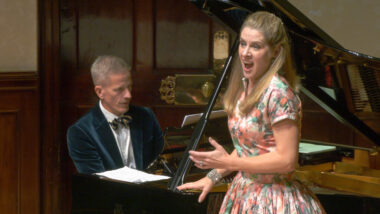 United Kingdom Various: Malin Byström (soprano) and Magnus Svensson (piano). Wigmore Hall, London, 30.9.2024. (KMcD)
United Kingdom Various: Malin Byström (soprano) and Magnus Svensson (piano). Wigmore Hall, London, 30.9.2024. (KMcD)

Fauré – Clair de lune, Op.46 No.2; Notre amour, Op.23 No.2
Duparc – La vie antérieure; Le manoir de Rosemonde; Chanson triste; Extase; L’invitation au voyage
Pauline Viardot – Sérénade for solo piano
Poulenc – Les chemins de l’amour
Cécile Chaminade – L’été
Berg – Sieben frühe Lieder
Ture Rangström – Pan Idyll: Den enda stunden; Den mörka blomman: Bön till natten; Vingar i natten
Weill – Je ne t’aime pas; Youkali
Malin Byström’s Wigmore Hall recital was a testament to her artistry and versatility as one of today’s most in-demand sopranos. Accompanied sensitively, by the technically assured Magnus Svensson, Byström presented a programme that spanned a wide range of musical styles, from the French mélodies of Fauré and Duparc to Alban Berg, via her compatriot Ture Rangström, before concluding with two of Kurt Weill’s cabaret songs.
Byström began the evening with a delicate rendition of Fauré’s Clair de lune (Moonlight) and Notre amour, (Our love) effortlessly evoking the romantic nuance of the French composer’s lyrical style. Her voice captured the shimmering beauty of Fauré’s music, bringing clarity and warmth to each phrase. This sensitivity was further embodied in a selection of songs by Henri Duparc which included La vie antérieure (A Previous Life) and L’invitation au voyage (Invitation to Journey), where Byström’s vocal control and expressiveness allowed her to paint Baudelaire’s vivid emotional landscapes with the voice. These pieces, although restrained, were powerfully voiced, with Byström handling the subtle shifts between melancholy and longing masterfully.
It has to be said though that her voice is on the large side for this kind of repertoire – at times she did not hold back on the decibels where she might have – so there were several occasions where more light and shade would have been welcome.
Byström was more at home with the work that opened the second half, Berg’s Sieben frühe Lieder (Seven Early Songs). Here, her dramatic skills truly shone as she navigated the darker and more complex harmonies of this early twentieth-century masterpiece, embracing the more intense emotions Berg afforded her. Each song was infused with a deep emotional resonance, enhanced by Svensson’s intelligent accompaniment, which supported Byström admirably. Her ability to navigate the shifting moods and complex vocal lines was impressive, and she imbued each song with a distinct vocal palette, bringing every colour in her voice to the fore. In the haunting Nacht (Night), her voice captured a sense of eerie stillness, while in Traumgekrönt (Crowned with Dreams), she conveyed a sense of radiant, yet distant, ecstasy.
The recital’s Scandinavian flavour was represented in a selection of songs from her compatriot, Ture Rangström. These songs were a revelation, each evoking a different state of emotion, and done so with assurance. In particular, Bön till natten (Prayer to Night) and Vingar i natten (Wings in the Night) stood out – Byström’s innate sense of phrasing, as well as her ability to convey the rich emotional undertones of the text, brought them vividly to life. There was a natural ease and warmth to her delivery, and it goes without saying that she felt completely at home singing in her mother tongue.
The evening concluded on a lighter note, with two cabaret songs by Kurt Weill – the cynical and sultry Je ne t’aime pas (I don’t love you) and the evocative Youkali. Here, she shifted from classical precision to the more playful, world weariness of Weill’s cabaret style. Byström’s ability to switch so effortlessly between styles was impressive, confirmation, if that were needed, of her versatility as a performer.
Throughout the evening, Byström’s control over her voice was remarkable, whether in the quietest of pianissimos or the most soaring fortissimos. Her collaboration with Svensson felt intuitive, as he enhanced the overall narrative of each song through his skilful playing. This was an engaging and emotionally varied programme that showcased the breadth of Byström’s talent as a soprano and confirmed her status as one of today’s most exciting sopranos.
Keith McDonnell
